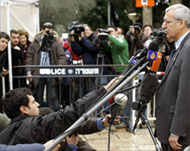Sharon drugs ‘may have caused stroke’
The massive stroke that Ariel Sharon suffered last week may have been caused by faulty medical treatment, an Israeli newspaper has reported.

The Haaretz daily said the Israeli prime minister was suffering from a brain disease, called cerebral amyloid angiopathy, that, in combination with blood thinners prescribed after a minor health scare last month, could have increased his risk of stroke.
Sharon collapsed last Wednesday and six days later remains critical in a Jerusalem hospital.
Quoting an unidentified member of Sharon’s medical team, the newspaper said that had the doctors known about the brain disease, they would not have prescribed the blood thinners.
However, the report said the condition sometimes can be diagnosed only after a brain hemorrhage.
Treatment
Sharon was given the blood thinners after suffering a mild stroke on 18 December, but the brain condition was discovered only after the second stroke, Haaretz said.
Yael Bossem, the spokesperson for the Hadassah hospital where the critically ill Sharon is currently fighting for his life, declined to comment on the Haaretz report.
 |
|
Doctors say Sharon is in critical |
“We are busy treating the prime minister and fighting for his life and nothing else,” she said.
Hospital doctors meanwhile pushed forward on Tuesday with efforts to bring Sharon out of an induced coma, a day after reporting slight progress in the Israeli leader’s recovery.
Hospital officials said Sharon’s condition did not change overnight, and he remained in critical but stable condition. He was still unconscious.
Doctors planned to continue reducing Sharon’s level of sedation on Tuesday, in a gradual process aimed at bringing him out of an induced coma. He was placed in the coma after last week’s stroke.
Response
Sharon started breathing on his own on Monday, though he remained hooked up to a respirator as a backup, and moved his right arm and leg in response to pain stimulation.
Sharon’s response is a “very important” sign and indicated his brain stem is working, said his chief surgeon, Dr Felix Umansky. It is still too early, however, to assess what impact the massive bleeding he suffered in his right brain would have on his abilities to think and reason or on the left side of his body, Umansky said.
“We are just at the beginning of a very long way,” the surgeon said.
A final medical analysis on Sharon’s long-term prognosis would end days of uncertainty over the fate of the 77-year-old prime minister. Doctors said his chances of survival are better, but he is far from out of danger.
|
“We are busy treating the prime minister and fighting for his life and nothing else” Yael Bossem, |
Before the stroke, Sharon had been expected to handily win re-election in 28 March parliamentary balloting, then use his third term to try to draw Israel’s final borders by pulling out of large parts of the West Bank and completing a separation barrier with the Palestinians.
More clarity on Sharon’s condition might enable his new, centrist Kadima Party to select a successor and start campaigning. Acting Prime Minister Ehud Olmert – Sharon’s ally and a proponent of unilateral withdrawals from more Palestinian-claimed lands – is seen as the most likely heir.
Sharon has not yet opened his eyes. His doctors hope he will resume consciousness when the sedative levels are lowered further, though outside experts cautioned there was no assurance he would wake up at all.
The doctors’ final assessment on Sharon’s brain damage, whenever it comes, will be presented to Attorney General Meni Mazuz, who will decide whether to declare the prime minister permanently incapacitated.
In the event of such a ruling, the Israeli cabinet would have to elect a prime minister within 24 hours, from among the five sitting Kadima cabinet ministers who are also lawmakers, said Justice Ministry spokesman Yaakov Galanti.